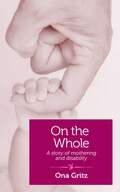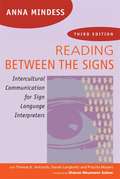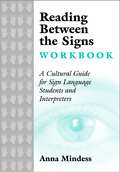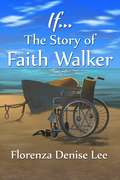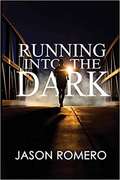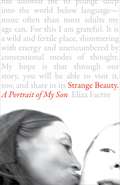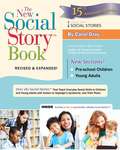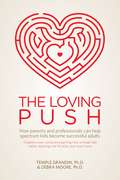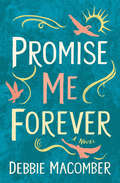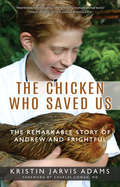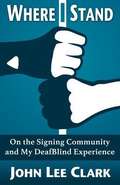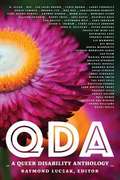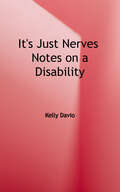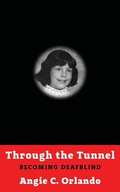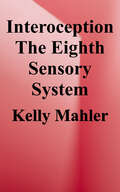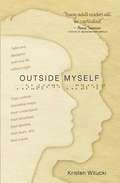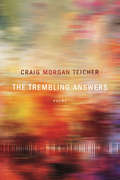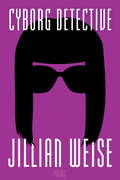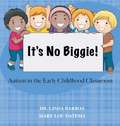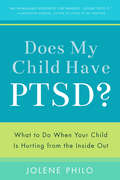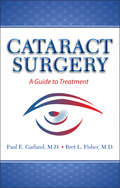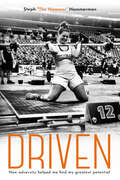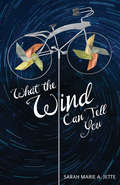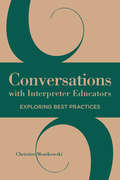- Table View
- List View
On The Whole: A Story of Mothering and Disability
by Ona GritzOna Gritz has had cerebral palsy all her life, but until she gave birth to her son, she didn&’t really understand what it meant to be disabled. Her cerebral palsy affects her coordination and balance but not enough to have ever truly hindered her. &“For the most part, I considered my disability a cosmetic issue,&” she tells us in On the Whole. &“Just how obvious is it? Do people see me as pretty despite the limp?&” But now she&’s got a new baby to care for, and no one has warned her what a physical job she has taken on. She can&’t bathe her son by herself or carry him up or down a flight of stairs. Nor can she feed herself or even open a refrigerator with a baby in her arms. And her baby will settle for nothing less than being in her arms. With lyricism and candor, poet Ona Gritz shares her son&’s first years with us, a time when she wanted nothing more than what all of us want—to be the perfect mother, only her imperfections kept getting in the way.
Reading Between the Signs: Intercultural Communication For Sign Language Interpreters
by Anna MindessIn Reading Between the Signs, Anna Mindess provides a perspective on a culture that is not widely understood-American Deaf culture. With the collaboration of three distinguished Deaf consultants, Mindess explores the implications of cultural differences at the intersection of the Deaf and hearing worlds. Used in sign language interpreter training programs worldwide, Reading Between the Signs is a resource for students, working interpreters and other professionals. This important new edition retains practical techniques that enable interpreters to effectively communicate their clients' intent, while its timely discussion of the interpreter's role is broadened in a cultural context.NEW TO THIS EDITION: New chapter explores the changing landscape of the interpreting field and discusses the concepts of Deafhood and Deaf heart. This examination of using Deaf interpreters pays respect to the profession, details techniques and shows the benefits of collaboration.
Reading Between the Signs Workbook: A Cultural Guide For Sign Language Students And Interpreters
by Anna MindessIn Reading Between the Signs, Anna Mindess provides a perspective on a culture that is not widely understood-American Deaf culture. With the collaboration of three distinguished Deaf consultants, Mindess explores the implications of cultural differences at the intersection of the Deaf and hearing worlds. Used in sign language interpreter training programs worldwide, Reading Between the Signs is a resource for students, working interpreters and other professionals. This important new edition retains practical techniques that enable interpreters to effectively communicate their clients' intent, while its timely discussion of the interpreter's role is broadened in a cultural context.NEW TO THIS EDITION: New chapter explores the changing landscape of the interpreting field and discusses the concepts of Deafhood and Deaf heart. This examination of using Deaf interpreters pays respect to the profession, details techniques and shows the benefits of collaboration.
The Tail of Max the Mindless Dog: A Children's Book on Mindfulness
by Florenza LeeAs a puppy Max’s tail is oftentimes hurt.Believing his tail to be the source of his pain, he sets out to catch and tie it in a knot. This leads to Max developing a habit of running in circles.Will Max learn a new more productive habit or will life pass him by?ABOUT THE TAIL OF MAX THE MINDLESS DOG, A CHILDREN’S BOOK ON MINDFULNESSIncorporates the Belly Breath, count of ten, and words of affirmation Adult and child are guaranteed to love this book. Mindfulness.
If…The Story of Faith Walker: The Story Of Faith Walker
by Florenza LeeImani is unlike other girls her age.Due to developing meningitis at birth, she received a life-saving surgery that resulted in her being a wheelchair user.This, however, has not hindered her from being an active, outgoing, caring young lady. While in Children’s Church, Matthew 14 catches her attention; it is the account of Peter walking on water. Imani is unsure as to why the story continues to speak to her heart, “Lord, if it is you, tell me to come to you on the water.” No matter what Imani does, she simply cannot shake the feeling that there is a message calling out to her from these verses. She feels as though she is on a quest to find clues to a puzzle she didn't even know existed. Do the verses mean she will one day walk again, or something else? Imani isn’t entirely sure; all she knows is she is about to have a faith walk, unlike any other.ABOUT ITIF…THE STORY OF FAITH WALKER This book demonstrates that faith may be utilized in every area of our lifes.
Running into the Dark: A Blind Man's Record-Setting Run Across America
by Jason RomeroA man takes on the challenge of a lifetime after hitting rock bottom. He finds himself divorced, unemployed and in a deep depression when a degenerative eye condition renders him blind with limited light perception. Feeling a calling to run across America, he dedicated the next two years of his life to prepare for, and ultimately run, over 3,000 miles from California to New York in less than 60 days, averaging 51.5 miles per day, to log the 7th fastest transcontinental foot crossing in the history of the world - less than 300 people have crossed America on foot. It was, and remains the only transcontinental foot-crossing by a blind person. <P><P> This is not just a book about running. This is a story of success and failure, healing and hurting, and loss and love. It is a book about struggling with adversity, learning to not give up or give in, to accept one's self for all that one is, and is not. It is every person's story. <P><P> Running into the Dark is a manifesto about how to continue ONWARD. <P><P> Jason Romero is a highly sought after Keynote Speaker for conventions, conferences and commencements, a US Paralympian who was 4th in the world at the Paralympic World Marathon Championships in 2015, a holder of 13 world records in ultra-running, the subject of a full length documentary and an author. In addition, Jason has been an attorney, an executive at GE and a CEO of a non-profit that helps children with Autism.
Strange Beauty: A Portrait of My Son
by Eliza FactorA unique and hopeful story of how one woman and her family were transformed by her child's multiple disabilities and inability to talk and how she, in turn, transformed a community.This intimate, no-holds barred memoir shares one family's experiences with a child who is both autistic and physically disabled. It is a story of infectious laughter, blood on the floor, intense physical conflict, and of two little girls growing up in the shadow of their charming and fitful brother. And it is the story of a mother and writer and the illuminating effect of imagining the world through the eyes of her beautiful, charismatic, and nonverbal son, Felix. Felix and his sisters inspire Eliza to start Extreme Kids, a community center that connects families with children with disabilities through the arts and play, and transform how she saw herself and the world. She writes of the joy this project brings her, as well as the disconnect of being lauded for helping others at the same time that she cannot help her own son.As Felix grows bigger and stronger, his assaults against himself grow more destructive. When his bruised limbs and face prompt Child Services to investigate the Factors for abuse, Eliza realizes how dangerous her home has become.Strange Beauty is a personal story, but it shines a light on the combustible conditions many families are living in at this moment. The United States offers parents whose children are prone to violence very little help. That Eliza's story ends happily, with Felix thriving at Crotched Mountain School, is due more to luck than policy. There are few such schools and many such children. When children are violent, we fail to account for the internal and external pressures that lead to violence. This is both cruel and counterproductive, for people with disabilities have much to teach us, if we will only listen.
The New Social Story™ Book Revised and Expanded 15th Anniversary Edition
by Carol GraySince the early 90s, Carol Gray's world-famous Social Stories have helped thousands of children with autism spectrum disorders. This 15th Anniversary Edition of her best-selling book offers ready-to-use stories that parents and educators have depended on for years, and new sections added are: How to most effectively use and apply the stories; How to improve the lives of younger children; and Social Stories for teens and adults with autism. Developed through years of experience, these strategically written stories explain social situations in ways children and adults with autism understand, while teaching social skills needed for them to be successful at home, school, work, and in the community.
The Loving Push: How Parents and Professionals Can Help Spectrum Kids Become Successful Adults
by Temple Grandin Debra MooreThe purpose of this book is to help parents let go and give careful, loving pushes to get their child to try new things. Temple Grandin, Debra Moore spell out which steps you can take to restore your child’s hope and motivation--and what you must avoid.
Promise Me Forever: A Novel (Debbie Macomber Classics)
by Debbie MacomberRomance between a man paralyzed in an accident and his physical therapist.
The Chicken Who Saved Us: The Remarkable Story of Andrew and Frightful
by Kristin Jarvis AdamsThe true story of an autistic boy with a body under siege by mysterious illness, and the chicken who saved his life."Heartbreakingly beautiful - the gift of the human animal bond.” - Temple Grandin, Author, researcher, consultant and world-renowned autism spokespersonEight-year-old Andrew was autistic and bilingual. He spoke English - and Chicken. But the day he told his pet chicken Frightful that his body was trying to kill him, Andrew’s family and an entire medical community were launched into a decade-long quest for answers. This honest memoir of fierce and faithful parenting takes readers on a heartfelt journey through chronic illness and Asperger’s syndrome to discover the healing bond between a boy and his chicken. Navigating the complex landscape of modern medicine and genetics, through a rare diagnosis of Trisomy 8 Mosaicism and an experimental bone marrow transplant, readers venture to places where chickens talk, superheroes come alive, and a boy on the brink of death finds the courage to survive.
Where I Stand: On The Signing Community And My Deafblind Experience
by John Lee ClarkThis collection of essays from one of the country's leading voices on issues facing the signing community appears at a time of troubling trends and exciting new developments. Through his lucid and accessible prose, John Lee Clark delves into questions ranging from why hearing parents of Deaf children don't sign to how written American Sign Language will change the course of Deaf literature. As a second-generation DeafBlind man, Clark also takes us on a tour of his experiences as a student, father, husband, and "client" of special services. Filled with startling observations and unapologetic assertions, Where I Stand challenges and broadens readers' understanding of an important but often overlooked community.
QDA: A Queer Disability Anthology
by Raymond LuczakQDA: A Queer Disability Anthology features fiction, poetry, nonfiction, and comics by 48 writers from around the world.
It's Just Nerves: Notes on a Disability
by Kelly DavioWith equal parts wit and empathy, lived experience and cultural criticism, Kelly Davio's It's Just Nerves: Notes on a Disability explores what it means to live with an illness in our contemporary culture, whether at home or abroad. "When the body attacks itself, the crisis is not just of bones and blood, but of beauty and boundaries. 'Strange men have had their hands on me for days, ' Kelly Davio observes during a plasma treatment. Her skillful portrait of myasthenia gravis does not exist in a vacuum. It's Just Nerves is in keen dialogue with the world around us--critiquing modern health care, pub seating etiquette, alarming election outcomes, smarmy meditation culture, and caricatures of illness in ads and on screen. 'Oxygen is delicious, ' Davio reminds us, before the fire breaks out. A brisk, funny, and at times startlingly poetic memoir." --Sandra Beasley, author of Don't Kill the Birthday Girl: Tales from an Allergic Life. "Kelly Davio's It's Just Nerves feels like the book I've been waiting for all my life. If you want to know what it feels like to be a person with a disability in the 21st century, read this book. From mindfulness to yoga pants, Davio skewers ableist fabrications and brings us to a vital, ebullient, and sometimes terrifying reckoning with our real and shared human experience. She is a very funny writer and also a fearless one. Once I started reading these essays, I couldn't put them down; they resounded through me like poetry or truth." --Sheila Black, author of House of Bone and Love/Iraq. "Kelly Davio's got so much incredible stuff brewing together on every page of these nimble, shapeshifting essays: meditations on the politics of illness, the body in crisis, the spirit in bloom, David Bowie--all of it filtered, carefully, through the lithe sensibility of a poet. The results are equal parts witty and wise, heartrending and rapturous. Man, I loved this book." --Mike Scalise, author of The Brand New Catastrophe.
Through the Tunnel: Becoming DeafBlind
by Angie C. OrlandoUsing a mixture of prose and poetry, Angie C. Orlando shares indelible stories about growing up in a small Ohioan town, complete with posing for family pictures, watching high school football games, and playing saxophone in a marching band. Yet she is equally funny and unflinchingly honest about how classmates, medical professionals, and others have viewed her multiple disabilities, all of which had gradually became apparent over time. Through it all, she leaves her abusive husband and endures her brother's suicide to become her own person.
Interoception: The Eighth Sensory System
by Kelly MahlerInteroception, a newly identified eighth sense, allows us to "feel our internal organs and skin and gives information regarding the internal state or condition of our body." As such it is also a key component of our emotional experience. This is an area of difficulty for many, including those with autism spectrum disorders. <p><p>The book reviews the research underlying the effects of poor interoception and outlines strategies for how to ameliorate these effects.--Publisher
Outside Myself
by Kristen WituckiExtraordinary insight into living without sight Outside Myself will enlighten both young and old.
The Trembling Answers (American Poets Continuum)
by Craig Morgan TeicherWINNER OF THE 2018 LENORE MARSHALL POETRY PRIZEAn extension of and a departure from previous explorations of family and art, these poems delve boldly into tangled realities of fatherhood, marriage, and poetry. Dealing with the day-to-day of family life—including the alert anxiety and remarkable beauty of caring for a child with cerebral palsy—these personal narratives illuminate the relationship that exists between poetry and a life fiercely lived.
Cyborg Detective (American Poets Continuum #174)
by Jillian WeiseIn her third collection of poems, Jillian Weise delivers a reckoning to the ableism of the Western Canon. These poems investigate and challenge the ways that nondisabled writers have appropriated disabled bodies, from calling out William Carlos Williams to biohacking Raymond Carver’s “Cathedral” to chronicling the ongoing headlines of violence against disabled women. Part invective, part love poem, Cyborg Detective holds a magnifying glass to the marginalization and fetishization of disabled people while claiming space and pride for the people who already use technology and cybernetic implants every day.
It's No Biggie! Autism in the Early Childhood Classroom
by Dr Linda Barboa Mary Lou DatemaWorking with young children is a rewarding job, but it's also challenging, even on the best of days. Early childhood teachers work with a variety of abilities and behaviors and make hundreds of decisions daily that affect the lives of children. As a teacher, having a bag of tricks that contains knowledge of child development as well as specific strategies to use in handling issues that arise is necessary. This book gives a basic understanding of child development that will help teach all the children who fall outside the "box" or along the autism spectrum, with or without a diagnosis. The basic behavioral concepts and strategies in this book will provide a foundational knowledge of child development. The more specific teaching tips will give a variety of ways to work with children who have additional challenges. When armed with knowledge of child development, an understanding of the autism spectrum, and good practical strategies for intervention will able to make an inclusive classroom, a great place to be for everyone.
Does My Child Have Ptsd?: What to Do When Your Child Is Hurting from the Inside Out
by Jolene PhiloA mother, advocate, and educator shares research and personal experience in this guide to help anyone care for children dealing with PTSD.Is it possible that the struggles you have with your child may be because he or she suffers from post-traumatic stress disorder (PTSD)? Once ignored, even by the medical professionals treating war veterans, PTSD is gaining global recognition as a very real and serious issue for those who have experienced traumatic events, even children. When children experience medical illness, witness violence, or are abused, it can leave a lasting effect. According to recent studies, 50 to 60 percent of children who experience these traumas early in life may suffer from a form of PTSD, leading to issues in childhood, through adolescence, and even into adulthood. Does My Child Have PTSD? is designed for readers looking for answers about the puzzling, disturbing behaviors of children in their care. With years of research and personal experience, Philo provides critical information to help people understand causes, symptoms, prevention, and effective diagnosis, treatment, and care for any child struggling with PTSD. “Philo’s dramatic story will capture the reader's attention, and there’s tremendous value in her patient explanations, from a simple definition of trauma to an exploration of PTSD causes, myths, and common terminology. . . . Though occasionally heart-wrenching, the book is organized so simply and logically as to be easy to follow and digest. Each chapter ends with “reflection questions” and additional valuable resources. Philo concludes on a hopeful note, providing encouragement and reassurance for other families in similar situations.” —Publishers Weekly, Starred Review
Cataract Surgery: A Guide to Treatment
by Bret L Fisher Paul E GarlandHaving cataract surgery? Nearly 3 million Americans who have cataracts removed each year. In fact, it's the most commonly performed surgery in the nation. And, the numbers are expected to increase--by the year 2020, nearly 30 million Americans will have cataracts. Even though cataract surgery is a common procedure, you may find yourself feeling anxious about an operation on your eye. Ophthalmologists Paul E. Garland, M.D. and Bret L. Fisher, M.D., have performed thousands of cataract surgeries, and they understand your questions and concerns. They answer questions such as: How long should you wait to have cataract surgery? What type of anesthesia is used? How is the cataract actually removed?
Driven: How adversity helped me find my greatest potential
by Steph The Hammer HammermanSteph Hammerman has been motivating herself and others her entire life. Since defying the odds by surviving as a one-pound, fifteen-ounce baby and weeks later being diagnosed with Cerebral Palsy, to beating Hodgkin's Lymphoma Stage 3B cancer in 2016, Steph has been a living example of overcoming seemingly insurmountable objects in order to achieve the impossible.
What the Wind Can Tell You
by Sarah Marie JetteIsabelle is fascinated by wind. And this year, she’s determined to win the middle school science fair with her wind machine. She’s just as determined to have her brother, Julian, who lives with a severe form of epilepsy and uses a wheelchair, serve as her assistant. But after Julian has a grand seizure, everything changes. Isabelle is suddenly granted entry into Las Brisas, a magical world where Julian’s physical limitations disappear, and one, she discovers, that he visits every night. The more Isabelle explores Las Brisas, the more possibilities she sees—for Julian, and for herself—and the more she finds herself at odds with her parents. Debut author Sarah Marie A. Jette has told, with remarkable insight and humor, a powerful story of a family struggling to love without fear.
Conversations with Interpreter Educators: Exploring Best Practices
by Christine MonikowskiSign language interpreter education is a relatively young field that is moving toward more theory-based and research-oriented approaches. The concept of sharing research, which is strongly encouraged in this academic community, inspired Christine Monikowski to develop a volume that collects and distills the best teaching practices of leading academics in the interpreting field. In Conversations with Interpreter Educators, Monikowski assembles a group of 17 professors in the field of sign language interpretation. Through individual interviews conducted via Skype, Monikowski engages them in informal conversations about their teaching experiences and the professional publications that have influenced their teaching philosophies. She guides each conversation by asking these experts to share a scholarly publication that they assign to their students. They discuss the merits of the text and its role in the classroom, which serves to highlight the varying goals each professor sets for students. The complexity of the interpreting task, self-reflection, critical thinking, linguistics, backchannel feedback, and cultural understanding are a sampling of topics explored in these exchanges. Engaging and accessible, Monikowski’s conversations offer evidence-based practices that will inform and inspire her fellow educators.
